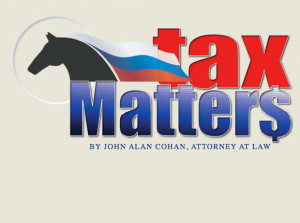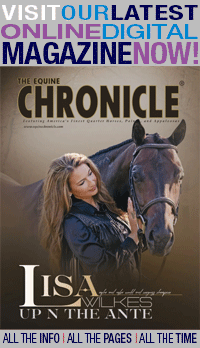Tax Matters – 7th Circuit Court of Appeals Reverses Tax Court Decision
Click here to read the complete article306 – July/Aug, 2016
BY JOHN ALAN COHAN, ATTORNEY AT LAW
 In a remarkable decision, the 7th Circuit Court of Appeals reversed a Tax Court opinion dealing with a Thoroughbred racehorse owner’s activities. The case, Roberts v. Commissioner, concluded that the taxpayer’s horse racing activities were entered into for profit. The Court characterized the Tax Court decision as untenable, in that it in effect concluded that a business’s start-up costs were not deductible business expenses and that every business starts as a hobby and becomes a business only when it achieves a certain level of profitability. The 7th Circuit opinion was an embarrassment not only for the IRS, but for the Tax Court judge in the case, Judge Elizabeth C. Paris.
In a remarkable decision, the 7th Circuit Court of Appeals reversed a Tax Court opinion dealing with a Thoroughbred racehorse owner’s activities. The case, Roberts v. Commissioner, concluded that the taxpayer’s horse racing activities were entered into for profit. The Court characterized the Tax Court decision as untenable, in that it in effect concluded that a business’s start-up costs were not deductible business expenses and that every business starts as a hobby and becomes a business only when it achieves a certain level of profitability. The 7th Circuit opinion was an embarrassment not only for the IRS, but for the Tax Court judge in the case, Judge Elizabeth C. Paris.
The taxpayer, Merrill Roberts, was a successful owner and operator of restaurants, bars and nightclubs in Indianapolis. In the ‘90s he began withdrawing from the business, becoming a consultant instead, and learned about the financial aspects of the horse-racing business. In 1999, he bought two horses for $1000 each, and in the first year netted $18,000 in purses. He built a horse track on a farm and increased his stock of race horses to 10, plus a breeding stallion. In addition, Mr. Roberts passed the state’s licensed-trainer test and obtained his horse-training license.
In 2005, Mr. Roberts acquired a larger property and invested in improvements for the training of racehorses. He trained the horses himself. He lobbied the Indiana legislature on behalf of horse racing, pushing for legislation to permit slot machines at racetracks, which ended up being enacted. He took on leadership roles in two professional horse-racing associations.
Mr. Roberts spent upwards of 12 hours per day working with the horses on race days and about eight hours a day on other days.
During the years at issue, Mr. Roberts’ expenses significantly exceeded his earnings. The Tax Court held that Mr. Roberts’ activity was a hobby in 2005 and 2006, but that it became a bona fide business in 2007. Accordingly, the Tax Court held that Mr. Roberts’ business a business in 2007. The 7th Circuit said that the activity evolved from his decision in 2005 to build a larger training facility, and to make substantial improvements to the property: “The Tax Court’s finding that his land purchase and improvements were irrelevant to the issue or profit motive until he began using the new facilities is unsupported and an offense to common sense.” The 7th Circuit added, “The judge seems not to have understood that the decision to build the facility, and its construction, are also indications of a profit motive.”
Click here to read the complete article306 – July/Aug, 2016










